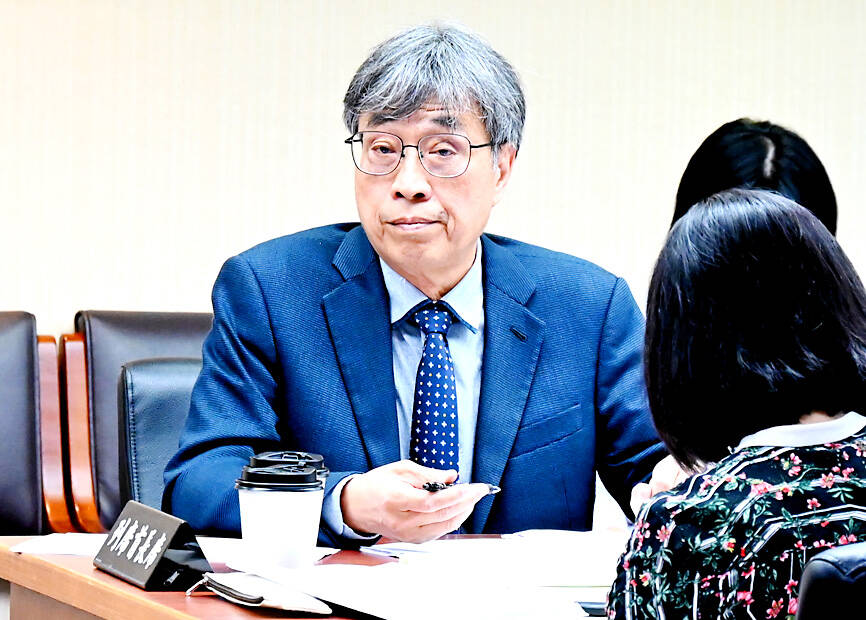The Ministry of Agriculture is launching a series of measures to boost the demand for Taiwan-
produced fresh milk to minimize the impact of the removal of tariffs on dairy products imported from New Zealand from 2025.
The zero-tariff policy for dairy products imported from New Zealand is part of an economic cooperation agreement between Taiwan and New Zealand, called ANZTEC, which was signed on July 10, 2013.

Photo: Chu Pei-hsiung, Taipei Times
At a joint meeting of four legislative committees yesterday, Chinese Nationalist Party (KMT) Legislator Lee De-wei (李德維) asked Acting Minister of Agriculture Chen Junne-jih (陳駿季) how the policy would affect the domestic fresh milk market.
“We have been holding talks with dairy farming industry representatives in the past year... The most important thing is to increase the demand for Taiwan-produced milk and distinguish it from milk imported from other countries,” Chen said.
The agricultural industry is redesigning the label for Taiwan-produced fresh milk and has developed the technology to identify any mixture of domestically produced milk and imported milk, he said.
Lee said the ministry should consider not calling imported liquid milk “fresh milk” to distinguish it from locally produced milk.
Chen said that the quality of Taiwan-produced fresh milk, as well as its low-carbon emission production process, should be recognized and affirmed by domestic consumers, which is a better way to distinguish between these two types of milk.
Chen told a meeting of the Economics Committee on Wednesday last week that the ministry is seeking approval from the Executive Yuan for a proposal to establish a four-year dairy farming industry development fund to mitigate the impact that the new policy might have on the domestic dairy farming industry.
The funding would be used to upgrade the local dairy farming industry, create demand for domestically produced dairy products and facilitate sales of these products, he said.
“We need to review the size of dairy cattle. Of the roughly 125,000 dairy cows in the country, 12,000 sick and weak ones are to be retired,” he said.
“We will seek to reduce the costs that dairy farmers spend to buy forage grass and incorporate the weather forecast system into the grass-drying process,” he said.
“We will also monitor the quality of domestically produced milk, coordinate the pricing scheme between ranches and dairy plants, reduce carbon emissions during the production process and facilitate the sales of domestically produced milk,” he added.
To boost demand for Taiwan-made dairy products, the government would increase the supply of fresh milk to school-age children and elderly people in farming and fishing villages, Chen said.
There would also be a traceability system for Taiwan-made dairy products, it said.
Some dairy farmers have suggested that the ministry intervene and help lower shelf placement fees for domestically produced dairy products in supermarkets or larger retail chains, as the fees generally account for 30 to 50 percent of retail prices.
“Pricing strategies for dairy products are determined based on various contracts between dairy plants and supermarkets, and it would be difficult for the government to intervene,” Chen said.

Chinese Nationalist Party (KMT) Chairman Eric Chu (朱立倫), spokeswoman Yang Chih-yu (楊智伃) and Legislator Hsieh Lung-chieh (謝龍介) would be summoned by police for questioning for leading an illegal assembly on Thursday evening last week, Minister of the Interior Liu Shyh-fang (劉世芳) said today. The three KMT officials led an assembly outside the Taipei City Prosecutors’ Office, a restricted area where public assembly is not allowed, protesting the questioning of several KMT staff and searches of KMT headquarters and offices in a recall petition forgery case. Chu, Yang and Hsieh are all suspected of contravening the Assembly and Parade Act (集會遊行法) by holding

PRAISE: Japanese visitor Takashi Kubota said the Taiwanese temple architecture images showcased in the AI Art Gallery were the most impressive displays he saw Taiwan does not have an official pavilion at the World Expo in Osaka, Japan, because of its diplomatic predicament, but the government-backed Tech World pavilion is drawing interest with its unique recreations of works by Taiwanese artists. The pavilion features an artificial intelligence (AI)-based art gallery showcasing works of famous Taiwanese artists from the Japanese colonial period using innovative technologies. Among its main simulated displays are Eastern gouache paintings by Chen Chin (陳進), Lin Yu-shan (林玉山) and Kuo Hsueh-hu (郭雪湖), who were the three young Taiwanese painters selected for the East Asian Painting exhibition in 1927. Gouache is a water-based

Taiwan would welcome the return of Honduras as a diplomatic ally if its next president decides to make such a move, Minister of Foreign Affairs Lin Chia-lung (林佳龍) said yesterday. “Of course, we would welcome Honduras if they want to restore diplomatic ties with Taiwan after their elections,” Lin said at a meeting of the legislature’s Foreign Affairs and National Defense Committee, when asked to comment on statements made by two of the three Honduran presidential candidates during the presidential campaign in the Central American country. Taiwan is paying close attention to the region as a whole in the wake of a

OFF-TARGET: More than 30,000 participants were expected to take part in the Games next month, but only 6,550 foreign and 19,400 Taiwanese athletes have registered Taipei city councilors yesterday blasted the organizers of next month’s World Masters Games over sudden timetable and venue changes, which they said have caused thousands of participants to back out of the international sporting event, among other organizational issues. They also cited visa delays and political interference by China as reasons many foreign athletes are requesting refunds for the event, to be held from May 17 to 30. Jointly organized by the Taipei and New Taipei City governments, the games have been rocked by numerous controversies since preparations began in 2020. Taipei City Councilor Lin Yen-feng (林延鳳) said yesterday that new measures by